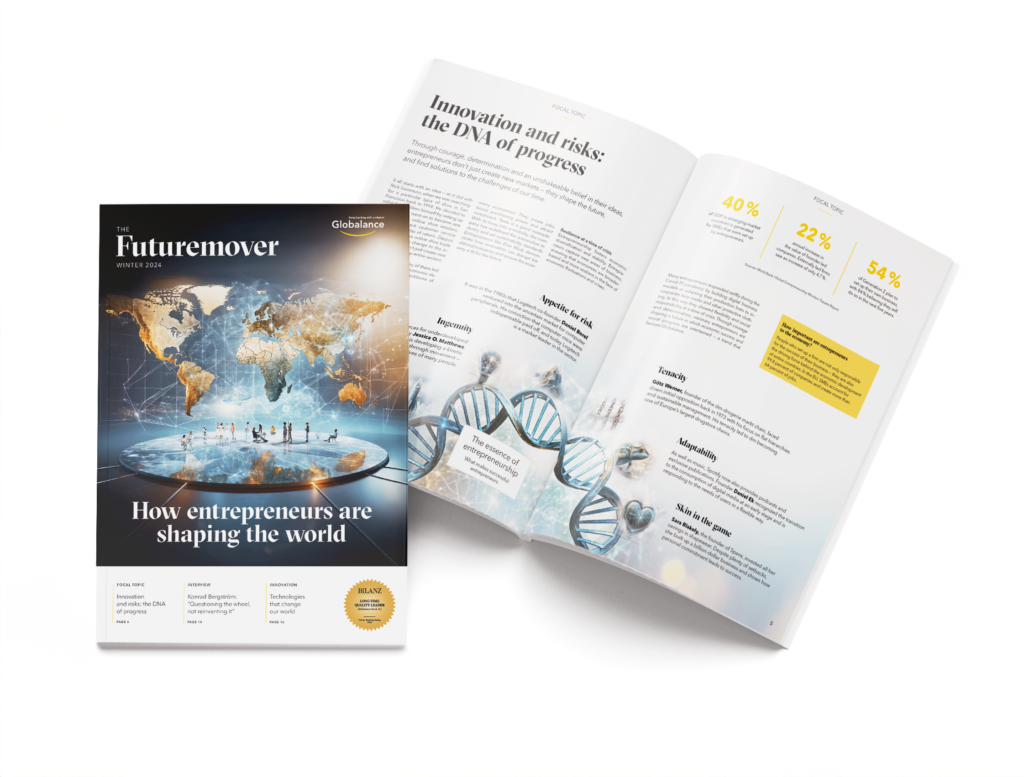News & Trends
“In 30 Years’ Time, We Will Have Jobs Where People Are at the Centre.”

The Exponential Age and Its Consequences – founder, author, newsletter producer and father Azeem Azhar in an interview for Globalance.
The interview as a podcast for when you’re on the road. Enjoy listening!
Read the interview in full.
Everything is changing at breakneck speed: when have there been similar developments in history that can help guide us? Or is it all so new to people that there is no historical evidence?
Azeem Azhar: What is indeed new, is the speed with which the changes are taking place. In earlier eras, too, there were phases of exponentially developing technologies, but the changes took place over a much longer period of time. Today, the changes are so fast that we hardly notice them any more. In five years’ time, we will be doing completely different things with our smartphones than we are doing today. In contrast, it took decades for the Gutenberg printing press to spread from Mainz to other European cities. That is the major difference.
In which area is the fastest development currently taking place?
Probably in biology. Twenty years ago, genome sequencing cost a billion dollars. Today, the cost is around 200 dollars. This price implosion is a great lever that opens up many new areas of application. We will also continue to see many interesting developments in computing. Perhaps they are no longer as tangible as they were with the smartphone, but below the surface, developments are advancing rapidly: in the field of machine learning, artificial intelligence, the need for more computer power is increasing enormously.
In mathematics, exponential functions are infinite. In the world of physics, there are limits. Do you see a point where things suddenly stop moving forward, where progress virtually freezes?
We see this, for example, in the internal combustion engine, which is no longer becoming much more efficient due to thermodynamic limits. What is exciting, is what happens when engineers reach these limits. Usually this does not mean the end. They look for new ways to push these boundaries. You can see that in the semiconductor industry: for several years now, physicists have been saying that the structures are now so small that they no longer work reliably. And yet, industry has managed to build better and faster computers thanks to new processes and designs.
For most people, the exponential age means being overwhelmed. What has to be done so that people are not left behind? In your book you speak of an exponential gap. How can it be overcome?
It is important that people have a say. We need to feel in control. How do we achieve this? For example, by getting involved at a political level and starting to ask questions. In the last 50 to 100 years, we have largely left technological progress to the engineers. Society must learn to have a say in which technologies it wants and which it does not want.
Do you already see the beginnings of this?
Yes, take climate change. We have recognised that we have to do something about greenhouse gas emissions. There is now a social consensus to push forward technologies that reduce CO2 emissions. This shows that society is not powerless.
We are largely powerless against technologies that change the way we work. What’s in store for us?
Technology has always had a big impact on the way we work. Most of the time it has relieved us of the need to do arduous physical work, which is a good thing. At the same time, though, it must be noted: technology primarily helps the providers of capital, i.e. the owners, much more than it helps the workers. When Western Europe industrialised 200 years ago, there was growth, countries became richer, but workers’ wages remained the same because the profits flowed to the providers of the capital.
Will exponential technologies exacerbate inequalities?
There are a few reasons to think that yes, this will be so. And that’s a problem. Of course, the pandemic has shown that the balance can shift in the other direction. Wherever there are shortages, wages increase.
Will we all be replaced by robots one day?
I don’t think so, at least not in the medium term. Interesting scenarios are emerging: the most competitive companies will make the most of technology by using artificial intelligence, investing in automation and buying robots. As a result, they will become more successful, grow faster and hire more people. Companies that don’t do this will have problems, their growth will decline – and they will have to lay people off. So when robots destroy jobs, this will happen in companies that are forced out of the market by very successful companies.
Just as has already happened in the retail industry?
Exactly, many retailers have gone bankrupt because companies like Amazon or JD.com in China relied very heavily on robots and automation, which allowed them to grow very quickly and hire more and more people.
Will we end up living in a world where there are a few big companies left, the Amazons and Googles, and everyone else will disappear?
What are the most valuable companies today? Almost exclusively companies that benefit from network effects. Whose services become even more valuable to future customers with each additional customer. And with each new customer, the data pool that can be made use of with artificial intelligence grows more. This is the reason why the big companies always want to get bigger. These companies are turning old certainties on their heads. Economists have long believed that new competitors can enter a market at a low threshold, spurring existing companies to become even more innovative and lower prices. In exponential markets, this logic no longer plays out. That’s a problem.
Yet there are still plenty of small businesses …
Sure, there’s room for lots of small businesses like bakeries, barber shops or mechanics, but those are all small businesses. These companies are the tenants of a digital platform provided by large companies. The big guys are the landlords who make the rules, determine the profit margins and define the customer flows, either directly or indirectly. The risk is that we create a kind of bizarre solar system in which dominant companies are the all-overshadowing centre, while the small companies revolve around it like planets.
The financial industry seems to have largely been spared of disruptive technologies until now. Why is this the case?
That’s true – but only until now. After all, we will see strong countervailing forces. I have seen that the brightest minds in computer science are currently working on Decentralized Finance.
By this, you mean a new financial architecture that does away entirely with intermediaries such as banks, insurance companies or exchanges, and where assets are mapped and exchanged in the blockchain? Isn’t this very much in its infancy?
Yes it is. The basic technology, blockchain, is only a few years old. It will therefore take time to develop the infrastructure. The Internet has existed since 1969. But in reality, it took until 1999 for it to have a serious impact. Blockchain is very young in comparison.
What are the geopolitical consequences of the exponential age?
We are living in interesting times. It’s like history is starting all over again (laughs). Exponentially developing technologies have a destabilising effect. We are already seeing the beginnings of this. Trade could decline even more because countries are once again producing more themselves thanks to new technologies such as 3D printing or robot-assisted food production. This means that they no longer have to deliver oil and coal from one part of the world to the other. When there is less trade, the peacemaking element of trade falls away.
You are the father of three children. How do you think they will be living in 30 years, what jobs will they be doing?
Certain physical labour will disappear. We will no longer mine coal or drill for oil. But we may pump CO2 into old oil wells to store it there. The next 30 years will see a continued shift of physical work to jobs that focus on people. We will increasingly do things that we now call service jobs. The more that physical work is taken over by automation, the more it will become our natural field of activity to work with other people.
If you could wish for anything from a fairy, what would it be?
I would like to see new public goods that are accessible to everyone. Goods such as Google’s search index or data on who is acquainted with whom, or on commuter flows in cities. These should be accessible to everyone like a public park or clean air. We have to ask ourselves whether these goods should be transferred from companies into the public realm, so that it is possible to build a future on their basis in a humanist way.
Azeem Azhar
Azeem Azhar has founded several companies and runs the very successful “Exponential View” newsletter with around 200,000 subscribers. His recently published book “The Exponential Age” deals with the consequences of rapid technological change on society, politics and the economy. The father of three children studied philosophy, politics and economics at Oxford University.



